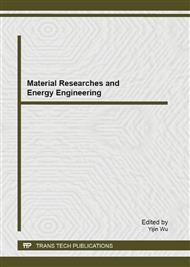p.524
p.530
p.536
p.543
p.549
p.556
p.560
p.566
p.571
Urban Low-Carbon Transport, Model of Pure Electric Vehicle Development Typical Research Based on Hangzhou Pure Electric Taxi Demonstration Operations
Abstract:
Pure electric vehicles, as an important part of China's strategic emerging industries with good economical potential and ecological environment and social benefits, are increasingly becoming the strategic choice to response to global warming and to achieve low-carbon transformation of urban transport. Hangzhou pure electric taxi demonstration project is a model for new energy vehicles first try, which has formed the complete and operating norms for pure electric taxies operating system and business mode. Based on the typical research of Hangzhou pure electric taxi demonstration operation status quo, the research group has summarized the practical experience of the demonstration operations and some problems of the mode of development of pure electric vehicle battery and supporting facilities, and put forward some policy recommendations.
Info:
Periodical:
Pages:
549-555
DOI:
Citation:
Online since:
September 2013
Authors:
Price:
Сopyright:
© 2013 Trans Tech Publications Ltd. All Rights Reserved
Share:
Citation:


